
Is acetate really better than plastic?
Is acetate really better than plastic?
Aaaaand we’re back to give our two cents on another highly nuanced and complicated topic hehe, IS acetate really better than plastic??
But first...what’s Acetate?
In the simplest words possible; acetate is a bio-plastic (a type of biodegradable plastic derived from biological substances rather than from petroleum) that is derived from a plant based material called cellulose (often derived from wood pulp) and mixed with acetic acid.

And we’ve all heard that plastic is ‘bad’, but here’s a quick science lesson:
Not only does plastic basically never go away once it’s made (Article), but another commonly overlooked downfall of plastic is that it’s derived from petroleum. Petroleum is a fossil fuel (non renewable resource) that is a HUGE contributor to carbon emissions. “Plastic refining (when crude oil is heated in a furnace to be separated and eventually turned into plastic) is among the most greenhouse-gas-intensive industries in the manufacturing sector—and the fastest growing”, according to CIEL.
Nonrenewable resource = supply is finite and can’t be replaced at the speed at which it is consumed.
Renewable resource = Can be used repeatedly and doesn't run out because it’s naturally replaced (i.e. if you cut down a tree, you can plant a new one)
Pros of Acetate?
Cellulose acetate is biodegradable
⇨ Study shows a cup made from cellulose acetate degraded more than 70% in a sewage-like environment within 18 months. In water it lost about 60% of its weight. Authors predicted that in a compost environment it would degrade much faster (Source). A plastic cup is estimated to take around 450 years to decompose (Source).
Recyclable
⇨ All of the scraps used during our manufacturing process are melted back down and recycled into new sheets of acetate. And while petroleum based plastics can also be recycled, they can only be down-cycled; every time plastic is melted down the integrity of the material degrades which leaves a limitation to how many times the material can actually be reused.
Lower carbon footprint
⇨ Avoiding burning fossil fuels (like petroleum) is small way to make a big difference in carbon emissions.
Durability
⇨ Acetate is more flexible and much less brittle than conventional plastic, making it far more durable. With plastic products you’ll see the quality degrade over the years, whereas acetate will maintain it's look and feel far longer.
Bio-Plastic isn’t perfect either so it’s only fair to acknowledge the cons that come with it.
Although acetate might degrade faster than conventional plastic, it can still take quite a while to biodegrade; anywhere from 1-10 years (depending on the environment). Also kinda unfortunate that a landfill is not an optimal condition for biodegrading. SMH.
On top of that, while it is recyclable, cellulose acetate isn’t accepted as a recyclable material through most recycling programs. So you can’t just throw it into your recycling bin and send it off to be reused like you can with some conventional plastics yet.
⇨ PSA, throwing in acetate materials can actually mess up the waste stream so don’t do it!
Not all acetates are made equally, there can still be a lot of chemicals in acetate that may not be safe for the environment. It’s important to still be mindful of what kind of acetate your products are made from.
So is acetate better or what??
I think we can all agree that acetate isn’t perfect, but when you’re comparing it to non-biodegradable, nonrenewable, fossil fuel burning plastic...it’s definitely a better option.
We still want to encourage you to be mindful of your consumption, and to take good care of your products so that you can keep them in use for as long as possible!!
If you have any questions, thoughts, concerns, DM us over on IG . We’ll be back for another Impact Series chat every week. :)